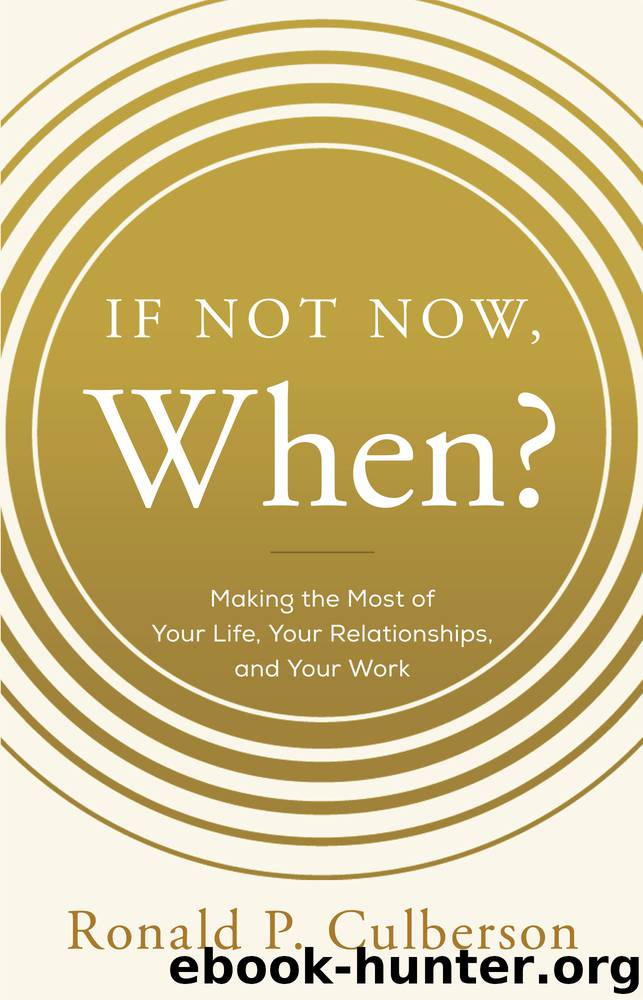If Not Now, When? by Ronald P. Culberson

Author:Ronald P. Culberson
Language: eng
Format: epub
ISBN: 9781626342965
Publisher: Greenleaf Book Group
Published: 2017-04-06T04:00:00+00:00
A Brief Lesson in Observation
Whatever the situation, the key to our perspective is observation. We must see what we can see.
When my niece was a baby, her mother sang the following song to her and every time the words “see” or “sea” came up, she’d shove my niece’s hands in the air to uproarious laughter.
A sailor went to sea.
To see what he could see.
But all that he could see,
Was the bottom of the deep blue sea.
The sea, the sea, the sea.
One of the keys to a rich life is to see what we can see. It’s called being observant. And, while it may seem obvious, it’s often the obvious things that go unnoticed. In other words, we don’t always see what we could see.
Several years ago, on my way to return a rental car, I stopped at a gas station to fill up the tank. There was a friend riding with me. I said, “I wonder what side of the car the gas tank’s on.”
He said, “The gas gauge shows you.”
I was shocked. I’ve been driving cars for thirty-five years and had no idea that the gas gauge had that capability. I felt totally auto impaired.
Immediately, I looked. Sure enough, right next to the little drawing of a gas tank was an arrow that pointed to the driver’s side of the car. But is that really what it means? I was skeptical. So, I jumped out of the car (after it stopped rolling, of course) to check. And he was right.
Who knew?
Now, every time I get in a car, I check to see if the arrow is there. It turns out it is in most cars. When did this happen? And why didn’t someone tell us? And what else am I missing because I either don’t look or I don’t even know to look?
Recently, I asked the members of my audience to look around the room and find something they had not previously noticed. Amazingly, everyone discovered a couple of items even though they’d been sitting in the room for several hours. What had been missing was the intentional attention necessary to truly see everything in the vicinity. Ironically, while they were noticing the room, I noticed that my pants were unzipped. So, the exercise was beneficial for all involved.
Jerry Seinfeld is a master of observation. His stand-up comedy routines are based on attention to details—details that are often so obscure, his sitcom was referred to as a show about nothing. In one of my favorite Seinfeld routines, he notices that his girlfriend bought a bag containing five hundred cotton balls. He’s curious as to why she needs that many cotton balls when he has never used one. So, he attempts to use five cotton balls over a week’s time. By the end of the week, he has struggled so much to use the five cotton balls, he has a headache. He opens a bottle of aspirin and discovers, of course, another cotton ball.
By making this obvious, yet often unattended, observation, Seinfeld developed a wonderful comedy bit.
Download
This site does not store any files on its server. We only index and link to content provided by other sites. Please contact the content providers to delete copyright contents if any and email us, we'll remove relevant links or contents immediately.
The Compound Effect by Darren Hardy(8915)
Tools of Titans by Timothy Ferriss(8356)
How to Be a Bawse: A Guide to Conquering Life by Lilly Singh(7464)
Deep Work by Cal Newport(7052)
Wiseguy by Nicholas Pileggi(5757)
Grit by Angela Duckworth(5588)
The Slight Edge by Jeff Olson(5402)
Discipline Equals Freedom by Jocko Willink(5365)
The Motivation Myth by Jeff Haden(5196)
The Laws of Human Nature by Robert Greene(5146)
Influence: The Psychology of Persuasion by Robert B. Cialdini(4757)
Year of Yes by Shonda Rhimes(4738)
The Miracle Morning by Hal Elrod(4697)
The Four Tendencies by Gretchen Rubin(4588)
Eat That Frog! by Brian Tracy(4505)
The Confidence Code by Katty Kay(4240)
Hyperfocus by Chris Bailey(4107)
Visual Intelligence by Amy E. Herman(3771)
The Inner Game of Tennis by W. Timothy Gallwey(3664)
